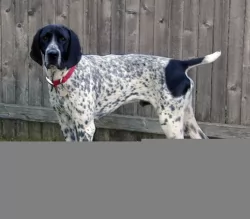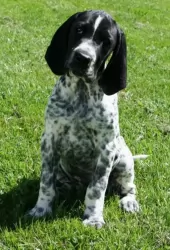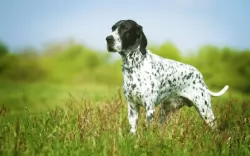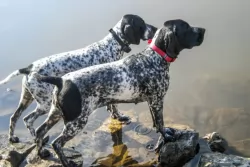 MyDogBreeds
MyDogBreeds Both Braque d'Auvergne and Basset Bleu de Gascogne are originated from France. Braque d'Auvergne may grow 27 cm / 11 inches higher than Basset Bleu de Gascogne. Braque d'Auvergne may weigh 44 kg / 98 pounds more than Basset Bleu de Gascogne. Both Braque d'Auvergne and Basset Bleu de Gascogne has almost same life span. Braque d'Auvergne may have more litter size than Basset Bleu de Gascogne. Braque d'Auvergne requires Low maintenance. But Basset Bleu de Gascogne requires Moderate maintenance
Both Braque d'Auvergne and Basset Bleu de Gascogne are originated from France. Braque d'Auvergne may grow 27 cm / 11 inches higher than Basset Bleu de Gascogne. Braque d'Auvergne may weigh 44 kg / 98 pounds more than Basset Bleu de Gascogne. Both Braque d'Auvergne and Basset Bleu de Gascogne has almost same life span. Braque d'Auvergne may have more litter size than Basset Bleu de Gascogne. Braque d'Auvergne requires Low maintenance. But Basset Bleu de Gascogne requires Moderate maintenance
 Sometime over 5 centuries ago, in the Cantal Region of France, was born a hunting breed, that might be the real ancestor of today’s pointing hunter dogs. Perhaps the oldest of all pointing gun dog is the Braque d’Auvergne. This breed comes from Central France in the region of Auvergne. This breed was developed prior to written dog breeding records in order to hunt in this region and find, point, flush out and retrieve fowl. This breed is clearly one of if not the oldest breeds in the French Braque. There is no agreement among historians on what breed is the oldest of the European pointing dogs and where they were developed – was it Spain or was it France? It is thought that the Braque Francais Gascogne is the original one of these in the early 1600’s while the Braque d’Auvergne came soon after. Due to the different hunting needs in the different parts of France, the Braque Francais Gascogne was crossed with a lot of other local scent hounds. The Braque d’Auvergne is one of the very oldest of all of these. There are records of the breeds existence in the 1700’s. It is probable that the Braque d’Auvergne was developed by crossing local dogs with Gascogne as well as with the Petit Bleu de Gascogne and the Grand Bleu de Gascogne.
Sometime over 5 centuries ago, in the Cantal Region of France, was born a hunting breed, that might be the real ancestor of today’s pointing hunter dogs. Perhaps the oldest of all pointing gun dog is the Braque d’Auvergne. This breed comes from Central France in the region of Auvergne. This breed was developed prior to written dog breeding records in order to hunt in this region and find, point, flush out and retrieve fowl. This breed is clearly one of if not the oldest breeds in the French Braque. There is no agreement among historians on what breed is the oldest of the European pointing dogs and where they were developed – was it Spain or was it France? It is thought that the Braque Francais Gascogne is the original one of these in the early 1600’s while the Braque d’Auvergne came soon after. Due to the different hunting needs in the different parts of France, the Braque Francais Gascogne was crossed with a lot of other local scent hounds. The Braque d’Auvergne is one of the very oldest of all of these. There are records of the breeds existence in the 1700’s. It is probable that the Braque d’Auvergne was developed by crossing local dogs with Gascogne as well as with the Petit Bleu de Gascogne and the Grand Bleu de Gascogne.
In all of Western Europe, the region of Auvergne is not very populated and has unique geography in that is hilly and has many extinct and eroded volcanoes. A lot of the region is still unpopulated. In this environment, wildlife has flourished, and hunting is successful in providing food for the regions people. This circumstance with an abundance of birds, led to the breeding of the Braque Auvergne to specialize in hunting in this area. The breed is not very popular outside of Auvergne and probably never was. That fact allowed them to be devastated by the Second World War. The Reunion des Amateurs de Braque d’Auvergne (RABA) was started to promote the pure breeding and the protection of the d’Auvergnes. But when Auvergnes was occupied during the war, the slowed breeding of the Braque d ‘ Auvergne almost eliminated the breed. There might have only been about 25 dogs left following the end of the war. These remaining dogs were used to revive the breed, but it is still uncommon, but not rare. Individuals have been imported by other countries including North America. The United Kennel Club (UKC) accepted the breed in 2006 but is not accepted by the AKC (American Kennel Club). The breed is still a working breed and outside of France, very rare.
 The Basset Bleu de Gascogne is an old breed and also one of the most reserved of the Basset family. The Basset Bleu de Gascogne’s history can be traced back to the 14th century, originating in the region of Gascony, France. At one time there were very few of these dogs and Alain Bourbon began doing something about this in the early 20th century, although he didn’t document his breeding practices . There are theories though and one was that he bred a few of the very first Basset Bleu de Gascognes with the Basset Saintongeois and the Grand Bleu de Gascogne.
The Basset Bleu de Gascogne is an old breed and also one of the most reserved of the Basset family. The Basset Bleu de Gascogne’s history can be traced back to the 14th century, originating in the region of Gascony, France. At one time there were very few of these dogs and Alain Bourbon began doing something about this in the early 20th century, although he didn’t document his breeding practices . There are theories though and one was that he bred a few of the very first Basset Bleu de Gascognes with the Basset Saintongeois and the Grand Bleu de Gascogne.
Today the Basset Bleu de Gascogne is rarely found anywhere beyond France’s borders and there are only a few clubs for the Basset Bleu de Gascogne.
 The Braque d’Auvergne is a well built, strong hunting dog with long ears, a large head and a docked tail. His coat is white with black markings and black ears and head. The breed looks a lot like all the other pointing dogs from France. They are medium in stature and has the appearance of a working gundog. He is athletic, muscular and fit. Docking the tail is outlawed in many countries and all of the United Kingdom. In that case the tail is high on the rump and always straight. Their face and head are big for the size of the body and shaped like an oval. With a long muzzle, deep set eyes and a gentle expression, they are kindly and handsome dogs. Their skin is loose but not droopy or wrinkled like hound dogs.
The Braque d’Auvergne is a well built, strong hunting dog with long ears, a large head and a docked tail. His coat is white with black markings and black ears and head. The breed looks a lot like all the other pointing dogs from France. They are medium in stature and has the appearance of a working gundog. He is athletic, muscular and fit. Docking the tail is outlawed in many countries and all of the United Kingdom. In that case the tail is high on the rump and always straight. Their face and head are big for the size of the body and shaped like an oval. With a long muzzle, deep set eyes and a gentle expression, they are kindly and handsome dogs. Their skin is loose but not droopy or wrinkled like hound dogs.
 The Basset Bleu de Gascogne today is a striking looking hound, and is the most reserved o the Basset breeds. When you look at him, their general appearance is large but not too heavy. Long of build, his height at the withers is about 30 – 38cm, and he weighs up to 18kg.
The Basset Bleu de Gascogne today is a striking looking hound, and is the most reserved o the Basset breeds. When you look at him, their general appearance is large but not too heavy. Long of build, his height at the withers is about 30 – 38cm, and he weighs up to 18kg.
He has short legs, thick bones, long floppy ears and dark brown, sad eyes, but is still agile and able to get around quickly. This particular Basset has a short, smooth, dense coat which is black with a white mottled pattern and some tan marking around the feet and face. You’ll most times notice black patches over his ears and sides of his head and there will typically be a white blaze on his skull.
The attractive Basset Bleu de Gascogne is one of 6 Basset Hound breeds, and this one is an energetic, lively dog who possesses a great sense of smell. Easy to train, he slots in well with his human family, wanting to please them all the time. They just love his dark, sorrowful brown eyes and the gentle expression on his face. With his deep bark, he tries to talk to his family. He is fairly easy to train, and with socialization and training he makes an exceptional pet.
Perhaps one aspect of the Basset family that doesn’t go down well with dog owners is their wandering nature. As a scenthound, he often gets the scent of something and wants to put his nose down and follow it. If you haven’t got a sturdy wall or fence around your property, he’ll just wander off.
 This is a gentle, adaptable and obedient breed. With their intelligence and affectionate nature, they make great family dogs and are eager to please their people. Living with other dogs is fine but not with small, prey size animals. The Braque d’Auvergne should never be left alone pets like gerbils and hamsters. They must be socialized to cats as pets and not prey before living with them successfully. They need to work closely with one human partner. They are first and foremost a hunting dog and need some sort of hunting simulation. They are devoted to their families and want to be constantly in their presence. This can lead to separation anxiety if they are left alone too much. They are great with children and need a family.
This is a gentle, adaptable and obedient breed. With their intelligence and affectionate nature, they make great family dogs and are eager to please their people. Living with other dogs is fine but not with small, prey size animals. The Braque d’Auvergne should never be left alone pets like gerbils and hamsters. They must be socialized to cats as pets and not prey before living with them successfully. They need to work closely with one human partner. They are first and foremost a hunting dog and need some sort of hunting simulation. They are devoted to their families and want to be constantly in their presence. This can lead to separation anxiety if they are left alone too much. They are great with children and need a family.
 This smooth-coated breed with his low-set ears, his sad eyes, out-turned paws and gentle but intelligent pet make this dog an awesome, companionable pet. He is loyal, affectionate and devoted. They’re good with children and other pets, and can even make superb pets for older- or frail people who may lead a more sedentary lifestyle.
This smooth-coated breed with his low-set ears, his sad eyes, out-turned paws and gentle but intelligent pet make this dog an awesome, companionable pet. He is loyal, affectionate and devoted. They’re good with children and other pets, and can even make superb pets for older- or frail people who may lead a more sedentary lifestyle.
The Basset Bleu also sheds a bit less than their Basset Hound counterparts, although they do tend to shed throughout the year. He will require training, just like any dog really, but you don’t want to be harsh with training, as he is a gentle, sensitive dog.
Laid back, this dog which has always been an excellent hunter in days gone by, will make anyone a devoted, loyal friend.
 The Braque d’Auvergne is a healthy breed but can face some of the same health concerns as other pointers and hunting dogs. The long, droopy ears can get infected easily if wet and need to be cleaned regularly so that food or dirt are not trapped their either. Because of the small gene pool however they may be at risk for several issues. The breeders in France express concerns about possible hip dysplasia and testing is highly recommended. Because they are at risk for other conditions that might not show up until later in life, it is also recommended that they be tested by the Canine Eye Registration Foundation (CERF) as well as the Orthopedic Foundation for Animals (OFA).
The Braque d’Auvergne is a healthy breed but can face some of the same health concerns as other pointers and hunting dogs. The long, droopy ears can get infected easily if wet and need to be cleaned regularly so that food or dirt are not trapped their either. Because of the small gene pool however they may be at risk for several issues. The breeders in France express concerns about possible hip dysplasia and testing is highly recommended. Because they are at risk for other conditions that might not show up until later in life, it is also recommended that they be tested by the Canine Eye Registration Foundation (CERF) as well as the Orthopedic Foundation for Animals (OFA).
 A great aspect with Basset Bleus is that they have very few health issues and are quite laid back. They can easily get to 14 years of age and older with good nutrition and exercise. Nothing is set in stone however, and every breed can suddenly develop health problems.
A great aspect with Basset Bleus is that they have very few health issues and are quite laid back. They can easily get to 14 years of age and older with good nutrition and exercise. Nothing is set in stone however, and every breed can suddenly develop health problems.
Dogs like this with a deep chest can be prone to a condition known as gastric dilatation volvulus or bloat. This is a condition not to be taken lightly as it can be life threatening. Gastric dilatation volvulus means twisted stomach because of excessive gas or flatulence and your dog will require prompt treatment.
 The Braque d’Auvergne needs a high-quality diet fit for a working dog but not too much to make him obese. They are an active breed to choose a formula that is designed for working dogs.
The Braque d’Auvergne needs a high-quality diet fit for a working dog but not too much to make him obese. They are an active breed to choose a formula that is designed for working dogs.
Although no studies have been conducted on the Braque d’Auvergne’s health issues there are many conditions that similar breeds are susceptible to and the d’Auvergne might be as well. This includes any of the following:
This is an active, working dog who needs a lot of stimulation and exercise. The only real appropriate exercise for these dogs is hunting or outings in the woods. He not only needs the exercise, but he also needs to stimulate his sense of smell and his gundog intelligence. He might excel in lure chase or even a form or barn hunt. They certainly could excel at obedience trials and perhaps rally. If you are a weekend hunter then this is the ideal dog for you. They are so easy to train that they surpass other pointers for success with casual hunters. They hunt at a slower pace than many other gundogs. Their intelligence and athleticism lend itself well to agility and flyball also. They need a large (+acres)fenced in area to run and play.
 With his short coat, shedding isn’t a huge issue with the Basset Bleu. He sheds seasonally and then you will definitely have to brush him at least twice a week to get rid of all that loose hair.
With his short coat, shedding isn’t a huge issue with the Basset Bleu. He sheds seasonally and then you will definitely have to brush him at least twice a week to get rid of all that loose hair.
Some dog owners don’t get used to the slobbering of these dogs. Certainly, you will need to change his drinking water often because of this slobbering of his. It can result in the water containing viruses and bacteria which can cause infections in your dog.
These dogs tend to be lazy at home, so it will be up to you to see that he gets a good quota of exercise to prevent him becoming fat and prone to more illnesses. The backs, especially with added weight, can cause problems and this kind of dog shouldn’t be encouraged to jump off beds and couches.